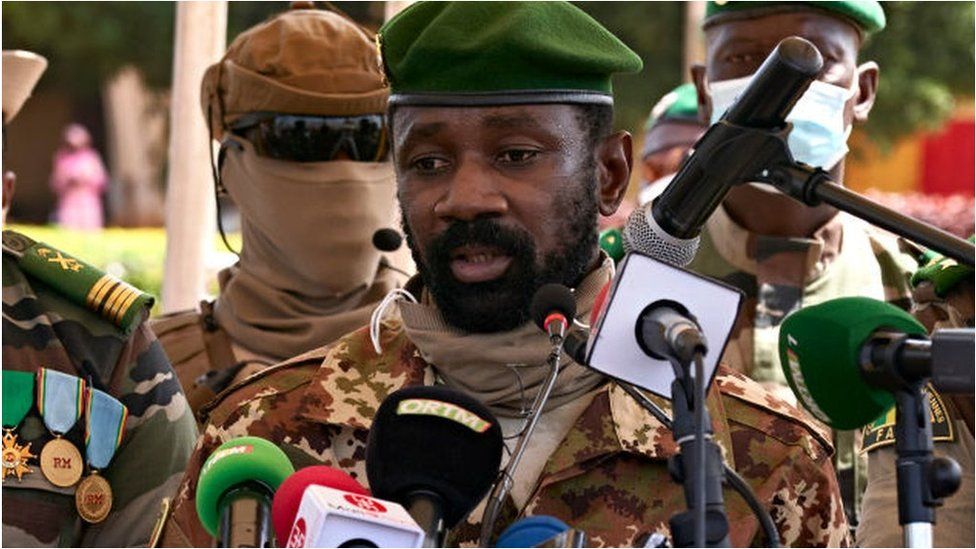Assimi Goïta
Assimi Goïta: A Comprehensive Background
Early Life and Military Foundations
Assimi Goïta, born on November 9, 1983, in Mali, emerged from a military background, as his father was an officer in the Malian Armed Forces. This familial heritage set the trajectory for Goïta's own career, as he aspired from a young age to join the military and follow in his father's footsteps. His early education was rooted in prestigious Malian military academies, including the Prytanée Militaire de Kati and the Joint Military School in Koulikoro. At these institutions, Goïta specialized in armored weapons and cavalry, laying the groundwork for his distinguished military service.
His military training was not confined to Mali; Goïta received further instruction from international partners, including the United States, France, and Germany. This diverse training, including special operations courses for combating terrorism in Germany and Special Operations Forces courses in Florida, USA, contributed to his expertise as a special forces commander. He gained experience working alongside the United States Army Special Forces.
A Rising Military Career and Confrontation with Insurgency
Goïta's early assignments after officer school saw him stationed across northern Mali, in cities such as Gao, Kidal, Timbuktu, Menaka, and Tessalit, starting with the 134th Reconnaissance Squadron in Gao in 2002. He quickly ascended through the ranks, demonstrating bravery and rigor in various operations. From 2005 to 2008, he served as Deputy Commander of the 123rd Reconnaissance Squadron in Kidal. Between 2008 and 2010, Goïta commanded a tactical subgroup engaged in the fight against armed groups and drug traffickers along the Mali-Algeria border.
His career heavily involved combating the jihadist insurgency that plagued Mali, especially in the central and northern regions. He commanded Malian special forces in the center of the country and led operations against armed groups. In 2012, Goïta oversaw military actions during the Tuareg rebellion in northern Mali. His extensive combat experience and success in challenging terrains earned him numerous decorations, including the Cross of Military Valor Medal and the United Nations Medal in Darfur, where he also served as a peacekeeper.
In 2014, he volunteered to serve in the Special Forces. Following the terrorist attack on the Radisson Blu Hotel in Bamako in November 2015, Colonel Goïta was seconded as Special Operations Coordinator of the Ministry of Defense to the Ministry of Security. From 2016 to 2017, he commanded the Operational Unit of the Autonomous Special Forces Battalion deployed in Sofara, and since July 2018, he has been in charge of the Autonomous Battalion of Special Forces and Warfare Centers.
The Coups and Rise to Interim Presidency
Assimi Goïta rose to significant political prominence as the leader of the National Committee for the Salvation of the People (CNSP), the military junta that seized power during the 2020 Malian coup d'état. This coup, on August 18, 2020, overthrew then-President Ibrahim Boubacar Keïta amidst widespread protests against corruption and the government's failure to address the ongoing armed rebellion. Initially, the CNSP pledged to initiate new elections and agreed to an 18-month political transition to civilian rule.
Under pressure from the Economic Community of West African States (ECOWAS), a transitional government was established. On September 21, 2020, Bah Ndaw was appointed interim president, and Goïta was named interim vice president, specifically in charge of defense and security matters. However, tensions soon emerged within this transitional leadership. Goïta claimed that Ndaw and Prime Minister Moctar Ouane were attempting to "sabotage" the transition to democracy and failed to consult him about a cabinet reshuffle that would have removed military officers from key ministerial positions.
This led to the 2021 Malian coup d'état on May 24, 2021, a "coup within a coup." Goïta led the army in detaining President Ndaw, Prime Minister Ouane, and the Minister of Defence. Both Ndaw and Ouane subsequently resigned. On May 28, 2021, Mali's Constitutional Court declared Assimi Goïta the interim President of Mali, granting him the title "president of the transition, head of state" to lead the transition process. He was formally sworn in on June 7, 2021. Following this, he appointed Choguel Kokalla Maïga as the interim prime minister.
Consolidation of Power and Current Stance
Since becoming interim president, Goïta has faced ongoing international pressure regarding a return to civilian rule and the holding of elections. He initially promised elections in 2022, but these were later delayed for another two years. In October 2024, Goïta promoted himself to the rank of General of the Malian Army, the highest military distinction, signaling his intention to maintain power. More recently, on May 13, 2025, he dissolved all political parties. On July 3, 2025, the transitional parliament approved a bill allowing Goïta to remain in office for a renewable five-year term, "as many times as necessary," without requiring an election, effectively entrenching his rule until at least 2030.
Under Goïta's leadership, Mali has significantly shifted its foreign relations, moving away from traditional allies like France and Western-backed organizations such as ECOWAS. Instead, Mali has forged closer ties with Russia, engaging in military and economic cooperation. This pivot aligns with a broader strategy of building regional solidarity and reclaiming sovereignty, particularly through the Alliance of Sahel States (AES), formed with Burkina Faso and Niger in September 2023, which Goïta has led as president since July 6, 2024.
Despite facing security crises and economic challenges, Goïta reportedly enjoys strong public support in Mali. His government argues that an extended mandate is necessary to combat terrorism and ensure national stability.
On July 20, 2021, Goïta survived an assassination attempt by a knifeman while praying at the Grand Mosque in Bamako during Eid al-Adha festivities. The assailant was immediately arrested, but later died in custody under unknown circumstances.
